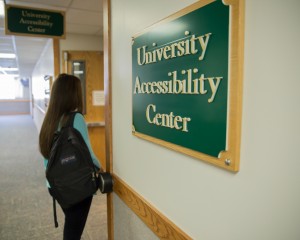
Sophia Gardner, a freshman with Type 1 diabetes, spent her first week of college adjusting her schedule.
Her new lifestyle of daily classes and the stress of being a freshman forced her to pay special attention to her diabetic needs.
“Adjusting to college with Type 1 diabetes is a little rough, to be honest. High altitude, cold weather and walking to classes all make your blood sugar drop, while stress makes it go high,” Gardner said. “There’s no formula that tells you how much insulin you need to be taking, so trying to fix your insulin doses with so many new factors at once gets really confusing.”
Type 1 diabetes is an autoimmune disease in which the immune system shuts down and attacks the pancreas. Insulin, the hormone the pancreas produces to deliver sugar to cells, is affected. Diabetics have to administer insulin in their systems to keep blood sugar levels in the proper range.
Gardner knew college would be challenging, but the added struggle of an autoimmune disease made the transition even harder. Poor blood sugar can have many negative effects, and those with diabetes have to be prepared when blood sugar levels spike or drop at inconvenient times.
“Instead of just worrying about taking a chem test, you’re worried because your blood sugar has been low all morning, and now you have to take a chem test when you can’t even think straight,” she said.
Gardner is aware that on-campus help is available for those dealing with diabetes and other diseases in school. She contacted the University Accessibility Center (UAC), which provides formal letters to professors detailing the accommodations a student needs according to his or her situation.
Gardner suggested that students who deal with a disability that affects their performance visit the UAC.
“I always feel weird asking for accommodations, since Type 1 diabetes isn’t a visible disability, but they were really supportive and understood that it causes legitimate problems,” she said.
Dr. Keith Willmore, a doctor at the BYU Student Health Center, recommended students see a practitioner. Willmore said he and his staff of family and nurse practitioners help students see the bigger picture and look into all facets that might contribute to amplifying the problem.
The health center refers patients to trusted specialists in the community if the student requires more complicated care.
“We have a good relationship with specialists in the community because they understand our role here, and they understand your role as a student with limitations on time (and) finances,” he said.
Talking to professors also helps. Professors are more willing to work with a student affected by a disease or chronic illness when the student has discussed the situation with them.
BYU’s Counseling and Psychological Services is available through the Counseling and Career Center, located on the first floor of the Wilkinson Center. Counseling is free for students and allows them to talk through possible solutions that could make student life more manageable.
Disabilities Awareness Week is another helpful resource for students. Delta Alpha Pi (DAP), which stands for Disability Achievement Pride, will hold information booths and activities around campus Oct. 20–24 to spread awareness.
Some activities include a deaf inclusion workshop, an ADHD screening, a descriptive movie, wheelchair sports and forum speakers. All students are invited to participate.
DAP President Carrie Sutter, a sophomore with bipolar disorder, encourages students dealing with disability or illness to build a support group.
“The most valuable advice I could give to someone with a disorder or illness is to build a support network with those you trust and to not keep it a secret from those who would be able to help you,” she said.
Sutter explained that a student can find support through bishops, counselors, friends, family members, doctors, school advisers and support groups within the community that offer alliance for those who are struggling with similar issues.
Those seeking additional resources to make the transition to college less difficult can visit the University Accessibility Center, talk to a practitioner at the Student Healthcare Center, talk to professors or schedule a free counseling session at the Counseling and Career Center.




